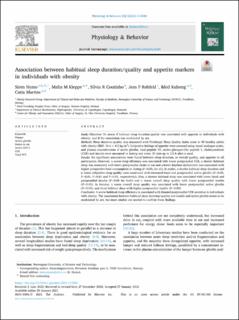Association between habitual sleep duration/quality and appetite markers in individuals with obesity
Nymo, Siren; Kleppe, Malin M.; Coutinho, Silvia; Rehfeld, Jens F.; Kulseng, Bård Eirik; Martins, Catia
Peer reviewed, Journal article
Published version

Åpne
Permanent lenke
https://hdl.handle.net/11250/2825424Utgivelsesdato
2021Metadata
Vis full innførselSamlinger
Sammendrag
Study Objectives: To assess if habitual sleep duration/quality was associated with appetite in individuals with obesity, and if the association was modulated by sex. Methods: Sleep duration/quality was measured with Pittsburgh Sleep Quality Index score in 95 healthy adults with obesity (BMI: 36.6 ± 4.2 kg/m2). Subjective feelings of appetite were assessed using visual analogue scales, and plasma concentrations of active ghrelin, total peptide YY, active glucagon-like peptide 1, cholecystokinin (CCK) and insulin were measured in fasting and every 30 min up to 2.5 h after a meal. Results: No significant associations were found between sleep duration, or overall quality, and appetite in all participants. However, a worse sleep efficiency was associated with lower postprandial CCK, a shorter habitual sleep was associated with lower postprandial desire to eat and a lower daytime dysfunction was associated with higher prospective food consumption in fasting (P<0.05, for all). In males, a shorter habitual sleep duration and a worse subjective sleep quality were associated with increased basal and postprandial active ghrelin (P<0.05, P<0.01, P<0.01 and P<0.05, respectively). Also, a shorter habitual sleep was associated with lower basal and postprandial insulin (P<0.05 for both) and a worse overall sleep quality with lower postprandial insulin (P<0.05). In females, a worse overall sleep quality was associated with lower postprandial active ghrelin (P<0.05), and short habitual sleep with higher postprandial insulin (P<0.05). Conclusion: A worse habitual sleep efficiency is associated with blunted postprandial CCK secretion in individuals with obesity. The association between habitual sleep duration/quality and insulin and active ghrelin seems to be modulated by sex, but more studies are needed to confirm these findings
